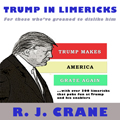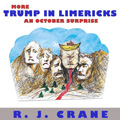|

You'll want to own our new book called Trump in Limericks featuring many of the limericks we wrote for our site currently plus lots of new ones you won't find anywhere else. There are over 300 limericks and 200 pages in the book. You will really enjoy reading it. Available in paperback and ebook. Get more ordering information here.

And you'll also want to buy our most recent book More Trump in Limericks with original artwork, poems, a few interesting topics, and over 100 limericks right up to the election. Now available in paperback. Find more ordering information here.
|